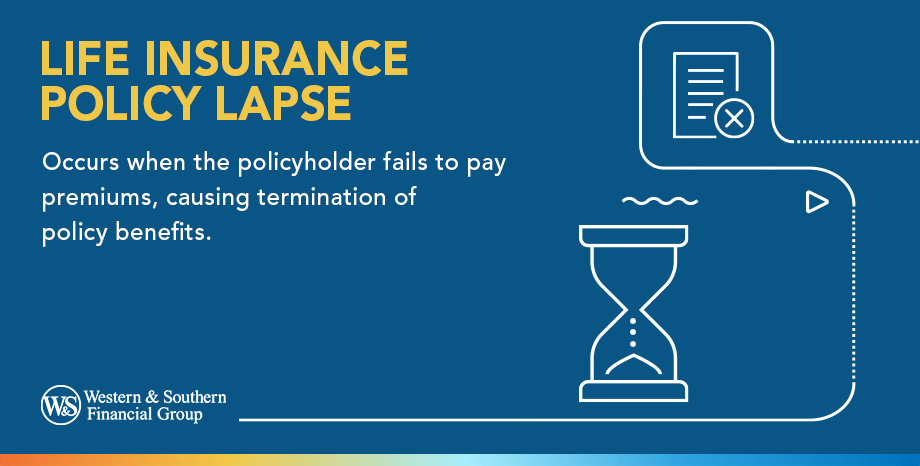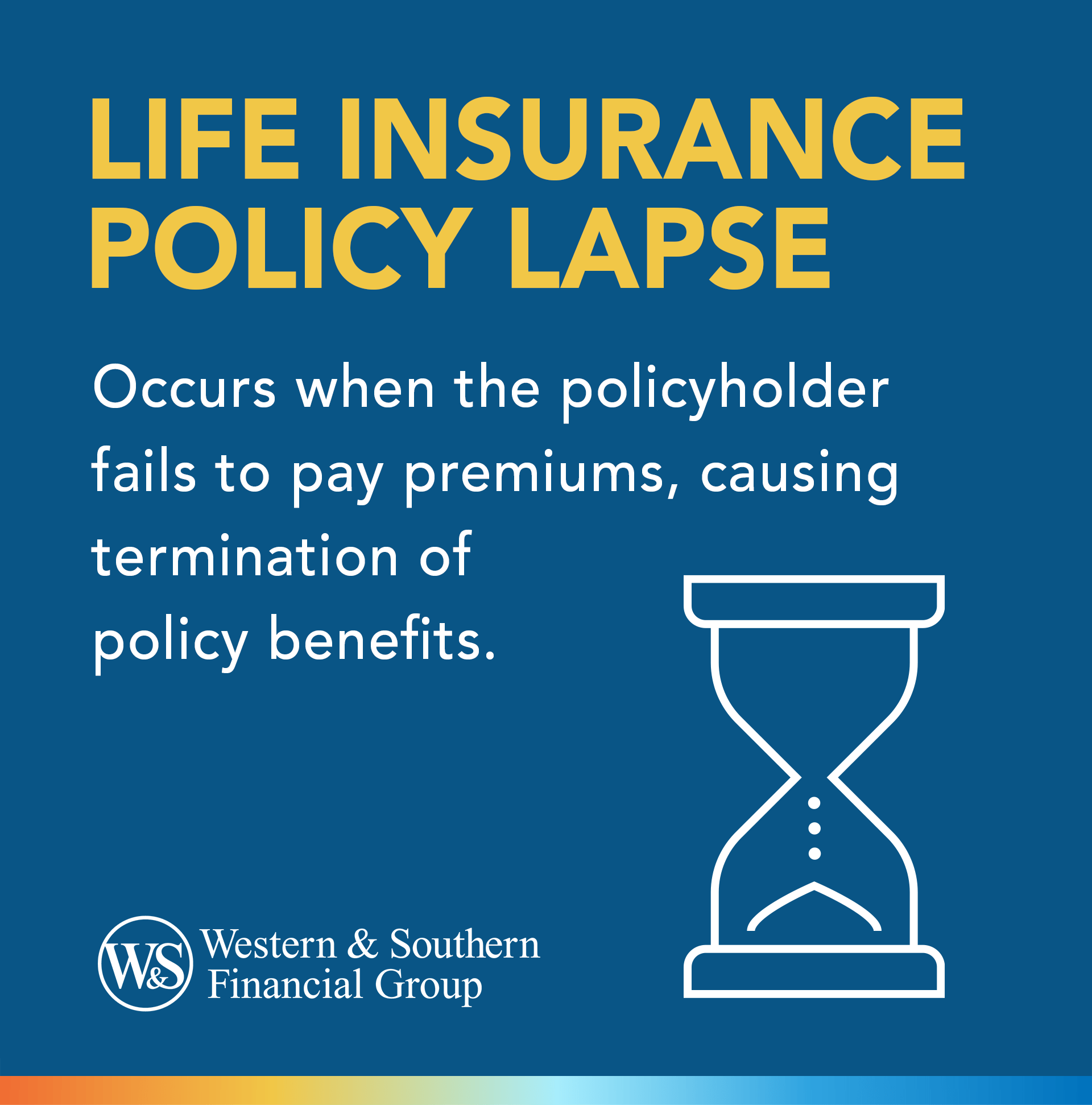

A life insurance policy lapse occurs when a policyholder fails to pay the required premiums, resulting in terminating the policy benefits. This situation can have considerable consequences for the insured and their beneficiaries. Understanding the reasons behind such lapses and how to avoid them is crucial.
Updated June 25, 2024

A Life Insurance Policy Lapse occurs when a policyholder fails to pay the required premium within the grace period stipulated by the insurance contract. When a policy lapses, the coverage it provides ceases, and the insured loses all the benefits associated with the policy.
In other words, the life insurance company will no longer be obligated to pay any death benefit or other contractual benefits if the policyholder dies after the policy has lapsed. It's important to note that once a policy lapses, it may be difficult or more expensive to reinstate or secure a new policy.
The specific conditions and consequences of a lapse can vary based on the terms of the insurance contract and the type of life insurance policy (e.g., term life insurance policy, whole life insurance policy, universal life insurance policy).
When an individual Life Insurance Policy lapses, several things can happen, often with significant implications:
Avoiding a lapse in life insurance coverage is crucial to help protect your beneficiaries' financial interests. Here are some strategies that may help:
If you anticipate financial difficulties, speak to your insurance company. They might offer solutions such as adjusting your coverage, changing the premium payment frequency, or leveraging policy benefits like a premium waiver in certain conditions.
Life insurance is a long-term commitment to providing financial security for loved ones. Taking proactive steps to avoid life insurance lapses ensures uninterrupted protection.
Avoid insurance lapse by understanding and acting within your grace period. Learn about life insurance grace periods.
Reinstating a lapsed policy means getting your coverage back in place after it has been terminated due to missed premiums. The process and conditions for reinstatement can vary across insurance companies, but here are the general steps and requirements for reinstatement:
Act Quickly: Most insurers have a reinstatement period, often ranging from 2 to 5 years from the date of the lapse, during which you can reinstate your policy. It's easier and more likely to be successful the sooner you act after the lapse.
Contact Your Insurance Company: Contact your insurer or insurance agent to discuss the reinstatement process. They will provide guidance and necessary forms to start the process.
Complete a Reinstatement Application: This form resembles the original insurance application. It asks for updated personal information and health history and may include other relevant questions.
Provide Evidence of Insurability: Depending on how long the policy has been lapsed and the insurer's requirements, you may need to undergo a medical exam or provide recent health records to prove insurability.
Pay Past-due Premiums: To reinstate your policy, you'll likely need to pay all the premiums due from the time of lapse, plus any interest or penalties the insurer charges.
Clear Any Policy Loans: If your policy had a cash value and you took out loans against it, you might need to repay the loan amount or adjust the policy to meet the insurer's reinstatement requirements.
Waiting Period: Some life insurance policies and companies have a waiting period after reinstatement before the full benefits of the policy become active again. Be sure to clarify this with your insurer.
Policy Riders and Benefits: Ensure that any riders or additional benefits (like accidental death benefit or premium waiver) that were part of the original policy are still in effect or discuss their reinstatement.
Keep Records: Always keep a copy of all documentation, payment proofs, and correspondence related to the reinstatement to ensure you have evidence in case of any disputes.
Seek Expert Advice: Talk to a financial advisor or insurance expert who can guide you through the process and ensure you make the best decisions based on your situation.
Remember, reinstating a lapsed policy is possible but not guaranteed. The insurer can decline the reinstatement based on changes in your health, age, or other factors. It's always best to avoid a lapse in the first place by staying vigilant about premium payments and policy terms.
Depending on your circumstances, there are a few alternatives to letting your life insurance policy lapse. These include:
It is essential to weigh each option's pros and cons carefully before deciding. As with all financial decisions, discussing your life insurance options with a financial advisor or insurance professional is recommended.
Don't let an avoidable lapse in life insurance put your loved ones at risk. Follow these proven steps to regain coverage quickly if your policy terminates. Protecting your family's financial interests deserves urgent attention.
Consider your options in helping secure your financial future. Get a Life Insurance Quote
The grace period in a life insurance policy is a set duration after the premium due date, during which the policyholder can pay the outstanding premium due without penalty and the risk of the policy lapsing. During the grace period, the life insurance coverage remains in effect, ensuring that the policy benefits are still applicable.
Yes, a lapsed life insurance policy can typically be reinstated within a certain period. However, you will need to pay any back premiums and interest, and you may need to undergo an additional underwriting process.
A reinstatement clause in a life insurance policy allows the policyholder to restore a lapsed policy to its original terms within a specified period, typically up to five years. This clause helps policyholders maintain their original coverage without purchasing a new policy after a lapse.
If you miss a life insurance payment, your policy will go into a grace period. The grace period is typically 30-90 days, but it can vary by Life Insurance Company and the type of policy. Your coverage remains in effect during the grace period, but you will be charged interest on the missed payment.
If you do not pay your premium within the grace period, your policy will lapse, ending your coverage and preventing your beneficiaries from receiving a death benefit if you die during this time.
Stay Insured Help protect your life insurance benefits.








































Information provided is general and educational in nature, and all products or services discussed may not be provided by Western & Southern Financial Group or its member companies (“the Company”). The information is not intended to be, and should not be construed as, legal or tax advice. The Company does not provide legal or tax advice. Laws of a specific state or laws relevant to a particular situation may affect the applicability, accuracy, or completeness of this information. Federal and state laws and regulations are complex and are subject to change. The Company makes no warranties with regard to the information or results obtained by its use. The Company disclaims any liability arising out of your use of, or reliance on, the information. Consult an attorney or tax advisor regarding your specific legal or tax situation.
![]()
Monday - Friday | 8 a.m. - 6 p.m. ET
Saturday | Closed
Sunday | Closed
Holidays | Closed
© 2017-2024 Western & Southern Financial Group, Inc.
Western & Southern is the marketing name for a group of diversified financial services businesses composed of Western & Southern Financial Group and its seven life insurance subsidiaries. Life insurance and annuity products may be issued by The Western and Southern Life Insurance Company, Western-Southern Life Assurance Company, Columbus Life Insurance Company, Integrity Life Insurance Company, The Lafayette Life Insurance Company, National Integrity Life Insurance Company or Gerber Life Insurance Company. Products and services referenced in this website are provided through multiple companies. Each company has financial responsibility only for its own products and services, and is not responsible for the products and services provided by the other companies. Not all products and services are available in all states. All companies are members of Western & Southern Financial Group and are located in Cincinnati, OH with the exception of National Integrity and Gerber Life, which are located in White Plains, NY.
This site is intended to provide a general overview of our products and services. Please review the details of each product with your financial representative to determine which options may best fit your needs.
Western & Southern Financial Group does not provide tax or legal advice. Please contact your tax or legal advisor regarding your situation. The information provided is for educational purposes only.
1 Superior ability to meet ongoing insurance obligations (second highest of 13 ratings; rating held since June 2009 for six out of seven of Western & Southern Financial Group’s life insurance subsidiaries, rating held since February 2024 for Gerber Life). Gerber Life is not rated by other rating agencies.
2 Very strong financial security characteristics (fourth highest of 21 ratings; rating held since August 2018)
3 Very strong capacity to meet policyholder and contract obligations on a timely basis (third highest of 21 ratings; rating held since June 2009)
4 Excellent financial security (fourth highest of 21 ratings; rating held since February 2009)
5 The Comdex Ranking is a composite of all the ratings a company has received from the major rating agencies. It ranks insurers on a scale of 1 to 100 (where 1 is the lowest) in an effort to reduce confusion over ratings because each rating agency uses a different scale.
Financial strength ratings apply to the individual member insurance companies affiliated with Western & Southern. Gerber Life is rated only by A.M. Best. The Lafayette Life Insurance Company is not rated by Moody’s.
This may contain information obtained from third-parties, including ratings from credit ratings agencies such as Standard & Poor’s. Reproduction and distribution of third-party content in any form is prohibited except with the prior written permission of the related third-party. Third-party content providers do not guarantee the accuracy, completeness, timeliness or availability of any information, including ratings, and are not responsible for any errors or omissions (negligent or otherwise), regardless of the cause, or for the results obtained from the use of such content. THIRD-PARTY CONTENT PROVIDERS GIVE NO EXPRESS OR IMPLIED WARRANTIES, INCLUDING, BUT NOT LIMITED TO, ANY WARRANTIES OF MERCHANTABILITY OR FITNESS FOR A PARTICULAR PURPOSE OR USE. THIRD-PARTY CONTENT PROVIDERS SHALL NOT BE LIABLE FOR ANY DIRECT, INDIRECT, INCIDENTAL, EXEMPLARY, COMPENSATORY, PUNITIVE, SPECIAL OR CONSEQUENTIAL DAMAGES, COSTS, EXPENSES, LEGAL FEES OR LOSSES (INCLUDING LOST INCOME OR PROFITS AND OPPORTUNITY COSTS OR LOSSES CAUSED BY NEGLIGENCE) IN CONNECTION WITH ANY USE OF THEIR CONTENT, INCLUDING RATINGS. Credit ratings are statements of opinions and are not statements of fact or recommendations to purchase, hold or sell securities. They do not address the suitability of securities or the suitability of securities for investment purposes, and should not be relied on as investment advice. Ratings are subject to change from time to time. The ratings shown here are correct as of February 20, 2024.
Gerber Life Insurance is a trademark. Used under license from Société des Produits Nestlé S.A. and Gerber Products Company.